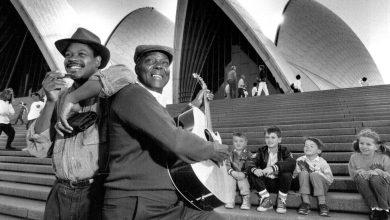Review: An Opera Saw Red-Pill Culture Coming. Now, It’s Back.

The makings of opera are quite simple. Strip away the clichés of an opulent art form populated by Viking helmets and powdered wigs (and more than 400 years of history), and you end up with DNA shared by Claudio Monteverdi, Richard Wagner and Meredith Monk across centuries: an artificial, elevated form of speech that reaches for the sublime.
Few composers have tested the fundamental qualities of opera as much as Robert Ashley, who died a decade ago at 83. He stretched language and banality to operatic extremes, exalting discarded bits of life as if they were cosmic, in stylized declamation that is every bit as musical as Mozart.
Hardly mainstream, Ashley’s works were often performed as he wrote them, then talked about more than staged. Since his death, though, there has been a wave of fresh recordings and revivals, the latest of which is “Foreign Experiences” (1994), now running at Roulette in Brooklyn. A portrait of a mind in free fall, red-pilled before we were talking about red-pilling, it is essential viewing for those interested in the possibilities of opera.
Picture an opera made entirely of a mad scene, and you have “Foreign Experiences,” an installment in “Now Eleanor’s Idea,” Ashley’s tetralogy whose construction recalls another four-work saga, Wagner’s “Ring.” In “Experiences,” the protagonist, Don Jr., spirals in isolation after a move to California, and from his apartment he imagines paranoid adventures in esoterica, in search of truths about power and wealth. He comes to conclusions like, “‘If you have to ask, you can’t afford one,’ I always thought we ought to have that carved into that stupid mountain with the four guys’ heads.”
Don Jr.’s thoughts come quickly; “Foreign Experiences,” alone in “Now Eleanor’s Idea,” is set to 90 beats per minute instead of Ashley’s usual 72. And those beats matter to each line of the opera’s 50-page libretto. This is a work of extreme mathematical precision that, in performance, shows no signs of being precise at all, with manic speech unfurling over ambient synth chords that reflect both the mood and sound world of “The X-Files.”




